Table of Contents Show
Navigating the diverse landscape of recreational vehicles requires a keen understanding of the various types of RVs available in today’s market.
As a beginner, selecting the right type of RV is crucial for a comfortable and enjoyable journey. In this guide, we aim to provide a clear overview of the different types of RVs.
In this article, we streamline the learning process and delve straight into the core distinctions that define each type of RV. So, let’s embark on this journey together, unraveling the world of RVs and discovering the perfect mobile abode for your wanderlust-filled escapades!
What Are The Differences in RV Types?
Overall, there are eight different types of RVs. This includes Class A Motorhomes, Class B Camper Vans, Class C Motorhomes, Fifth Wheels, Toy Haulers, Travel Trailers, Pop-Up Campers, and Truck Campers.
Each type caters to distinct preferences, travel styles, and budgets, allowing adventurers to choose an RV that aligns seamlessly with their desired on-the-road experience.
At the end of the day, RV types can be broken into towable RVs and drivable RVs. Within these two categories, you’ll find a range from compact travel trailers and camper vans to larger motorhomes and fifth wheels.
Now, let’s dive into the eight different types of RVs to further your understanding!

Different Types of Drivable RVs
When it comes to drivable RVs, the choices are as diverse as the landscapes you’ll explore. From the commanding Class A motorhomes exuding luxury and space to the nimble and compact Class B vans offering versatility and off-road capabilities, your options are endless.
Each category brings a unique set of features and advantages, so let’s dive in.
Class A Motorhomes
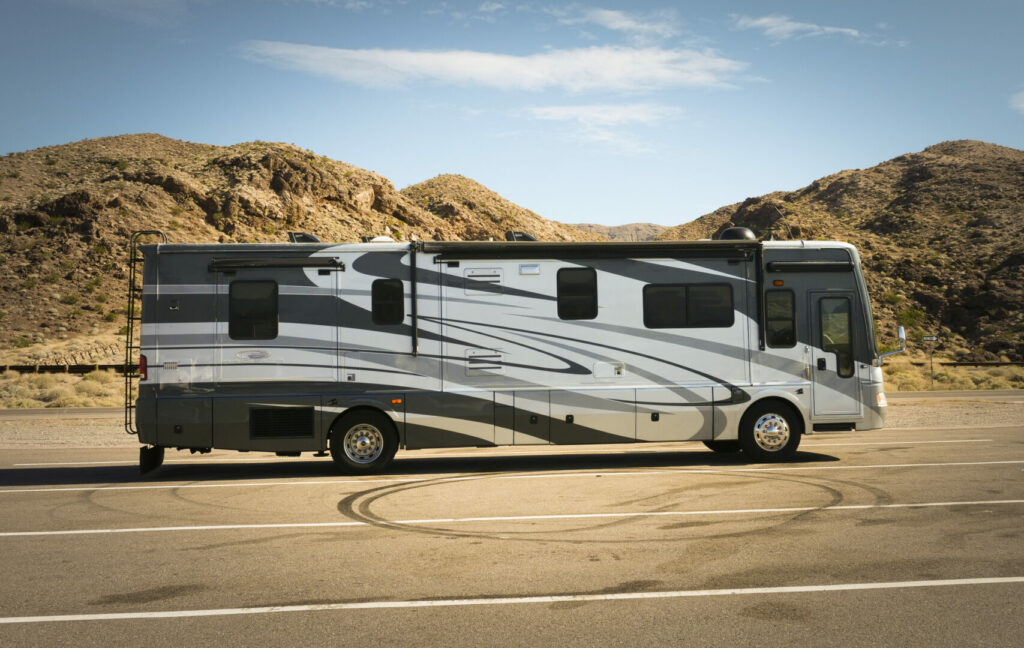
Class A motorhomes come in either gas or diesel fuel-powered. Diesel-powered Class A motorhomes are also known as diesel pushers.
Both gas and diesel Class As are typically filled with essential living appliances such as refrigerators, ovens, microwaves, and washers and dryers. Almost all have slide-outs, providing extra living space when parked.
You can find Class A RVs ranging from 21 feet to 45 feet. These RVs are luxurious and large, making them a great home away from home, or even a great full-time home.
Diesel engines typically run longer, but the downside is that they tend to be more expensive. Additionally, diesel pushers are quieter when going down the road since the engine is in the back, making for a more comfortable ride.
Gas-powered Class A RVs have the engine in the front, between the driver and passenger, so it can be a little loud and warm when driving.
Lastly, there is a third option of Class A RVs that falls under the category of a toy hauler motorhome. This means that the back end of the RV opens to a ramp, so you can load a motorcycle, side-by-side, kayak, or any other of your favorite toys.
There are only a few models of toy hauler motorhomes available on the market today since they reduce your living space even more than a traditional motorhome.
It’s also important to note that people who purchase a Class A motorhome typically have a smaller vehicle they bring along to get around the local area called a toad.
This smaller vehicle is normally towed behind the motorhome on all four wheels (called flat towing), with two wheels up on a dolly, or in an enclosed car trailer.
Class B Camper Vans
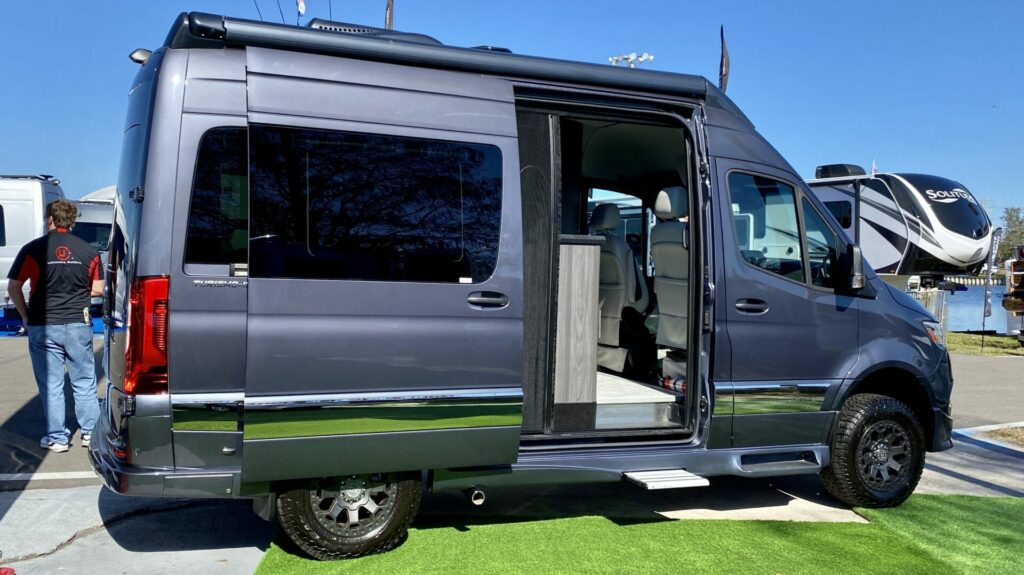
Next on our list are Class B camper vans. These small motorhomes are easy to drive as they typically measure between 20 feet and 25 feet in length.
Class B camper vans have creative interiors that provide unique ways to store and hide living essentials. Some of the innovations you’ll find in this type of RV include swiveling chairs, fold-up sinks, and seats that convert into beds.
With the limited space, the bathrooms are either not included or are wet baths. The smaller size allows for greater mobility and freedom on the road. You can normally fit in most parking lot spaces.
Class B camper vans are well-suited for solo travelers, couples, and minimalists seeking a compact and versatile travel experience. Their smaller size allows access to remote destinations, making them a favorite among adventure enthusiasts.
Class C Motorhomes
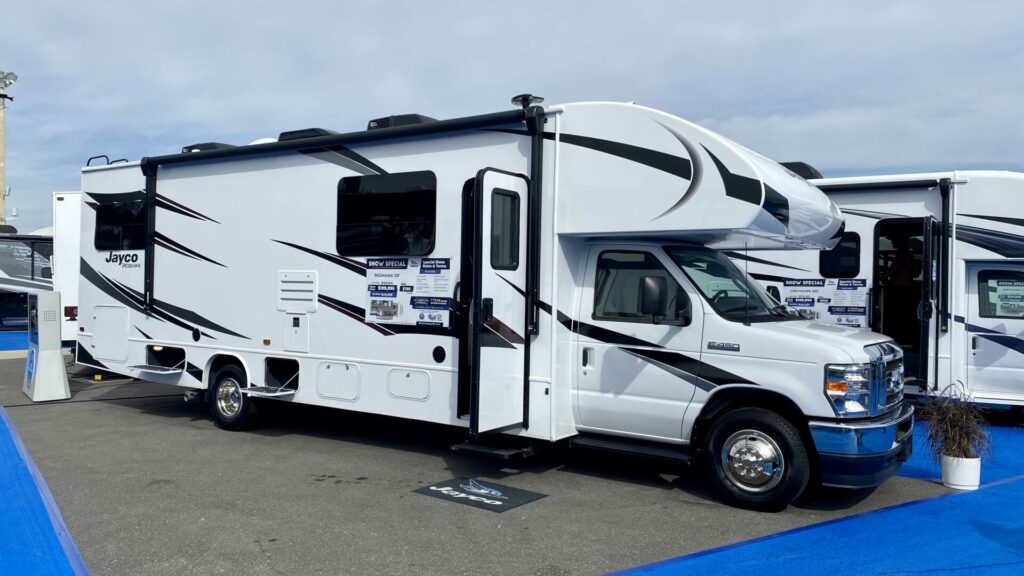
Smaller than a Class A but larger than a Class B, you’ll discover the versatile Class C motorhome. With a distinctive over-cab sleeping area, they maximize sleeping capacity, making them ideal for accommodating multiple passengers.
There are some models that are classified as Super Cs. While these are still considered Class C RVs, they are larger and typically built on semi-truck chassis. Read our article on What Is a Super C? to learn more about this type of RV.
Class C motorhomes RVs have standard features such as bathrooms, kitchens, and slide-outs. We think Class C RVs are a great middle-of-the-road option for travelers. They have more liveable space to spread out in than a class B, but you don’t have the major stress of a larger class A.
Additionally, Class C RVs drive more like a truck than a bus, so the learning curve is smaller.
Overall, Class C motorhomes cater to those looking for a family-friendly and well-equipped RV experience without the bulk of larger models.
Different Types of Towable RVs
Now that you have an understanding of the different types of drivable RVs let’s dive into the towable ones. From compact teardrop trailers to spacious toy haulers, towable RVs cater to a wide spectrum of adventurers.
Fifth Wheels
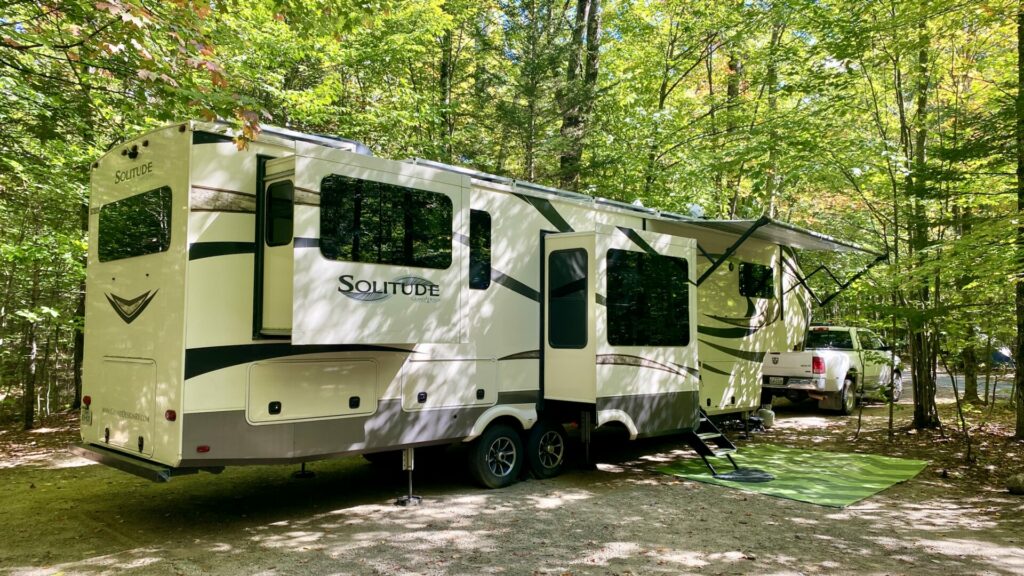
A fifth wheel is a type of towable RV that is hitched to the bed of a truck using a specialized hitch and kingpin. This design allows for better stability and maneuverability compared to traditional travel trailers.
Fifth wheels are characterized by a bi-level floor plan, with a raised front section extending over the truck bed. This elevated space typically houses a master bedroom, but recent floorplans have had the space become a kitchen or living room.
This type of RV often boasts extensive amenities such as multiple slide-outs, larger living areas, and high ceilings. Due to their size and features, fifth wheels are popular among those who want to sell it all and travel in an RV full-time.
Pro Tip: If you’re set on a towable RV but not exactly sure which type yet, be sure to read Fifth Wheel vs Travel Trailer: Which RV Is Better?
Toy Haulers
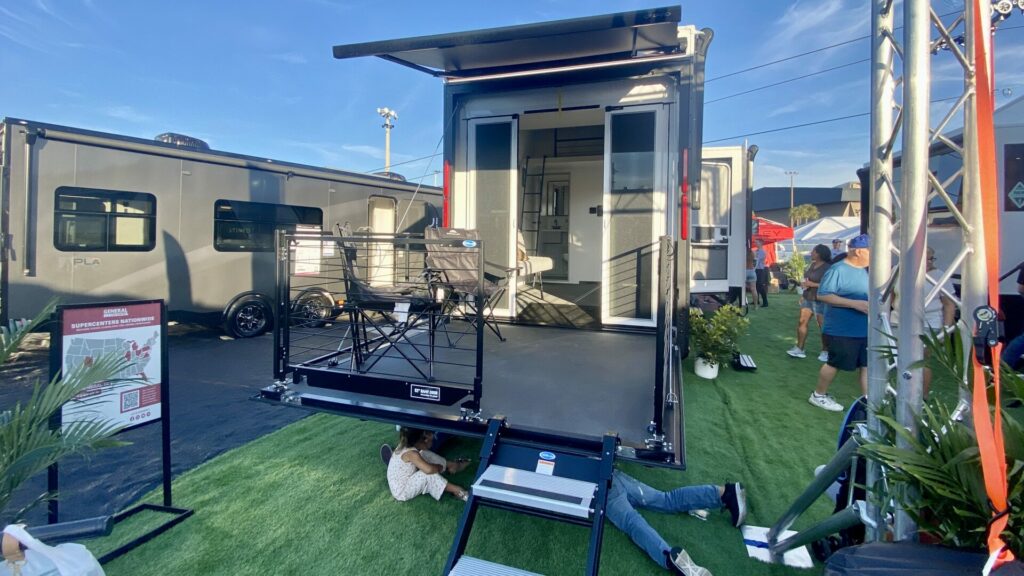
Toy haulers are a type of RV designed to transport things like motorcycles, ATVs, golf carts, kayaks, or bicycles, often referred to as “toys”. These RVs have a dedicated cargo area at the rear, equipped with a ramp for easy loading and unloading of recreational equipment.
On top of that, the cargo space can often be transformed into additional living quarters, such as a bedroom for children or an office. Some toy hauler models have a feature where you can turn the ramp into an outdoor patio as well. People love this type of RV because it provides a flexible and versatile layout.
Toy haulers come in various sizes and styles, from travel trailers to fifth wheels, offering a combination of living space and storage for adventure gear. This type of RV is particularly popular among outdoor enthusiasts who want to bring their toys along for the journey without compromising on comfort and amenities.
Travel Trailers
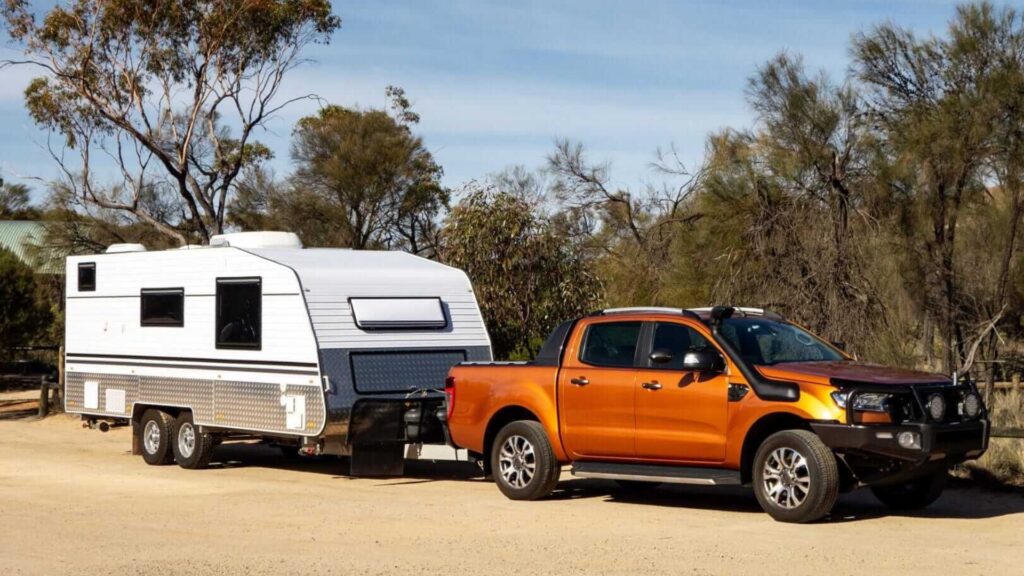
A travel trailer is a towable RV that is hitched to a towing vehicle, such as a car or truck, for transportation.
These are some of the more popular types of RVs, so you will find an abundance of floor plans available on the market. They come in various sizes and layouts, ranging from compact teardrop trailers to larger models with multiple rooms and amenities.
Travel trailers are known for their versatility and affordability, providing a comfortable living space on the road. They are popular among RV enthusiasts who prefer the flexibility of having a detachable living space and the ability to explore destinations with ease.
Pop-Up Camper Trailers
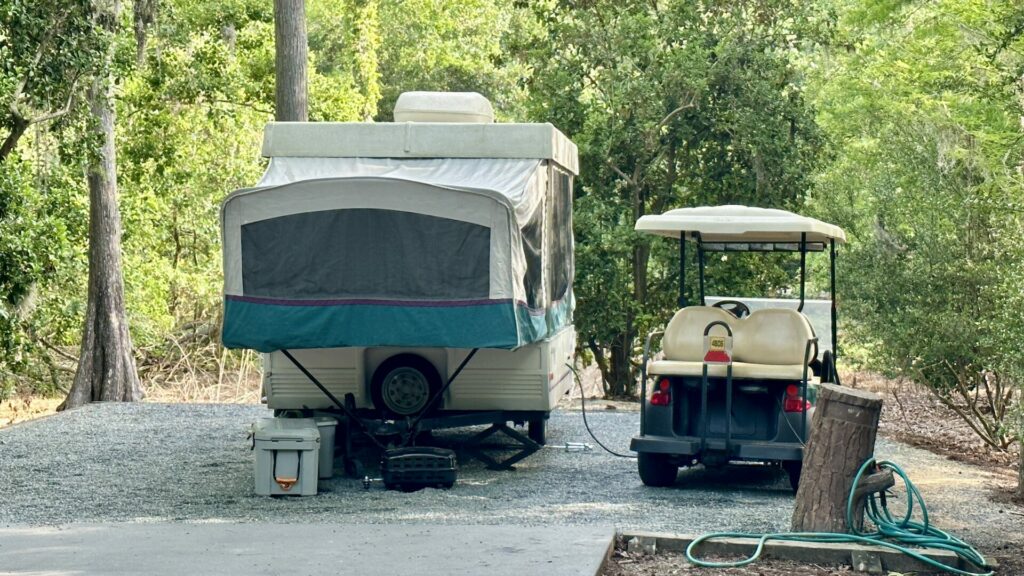
Pop-up campers come in many shapes and sizes. You might also hear them referred to as hybrid campers, A-frames, or soft-sided campers. No matter the name, a pop-up camper is characterized by its collapsible design.
This camper features a foldable roof and walls, typically made of canvas, but can also be hard-sided. When in transit, the trailer is compact, but when parked, it can be expanded to provide additional living space.
Pop-up camper trailers often include sleeping areas, a small kitchenette, sometimes a dinette, and occasionally a bathroom. They are easy to be towed by any vehicle, they’re affordable, and they can even fit a small family.
These trailers are popular among campers who desire a more immersive outdoor experience without sacrificing basic amenities, and they are especially well-suited for those who want a balance between the openness of tent camping and the comfort of an RV.
Truck Campers
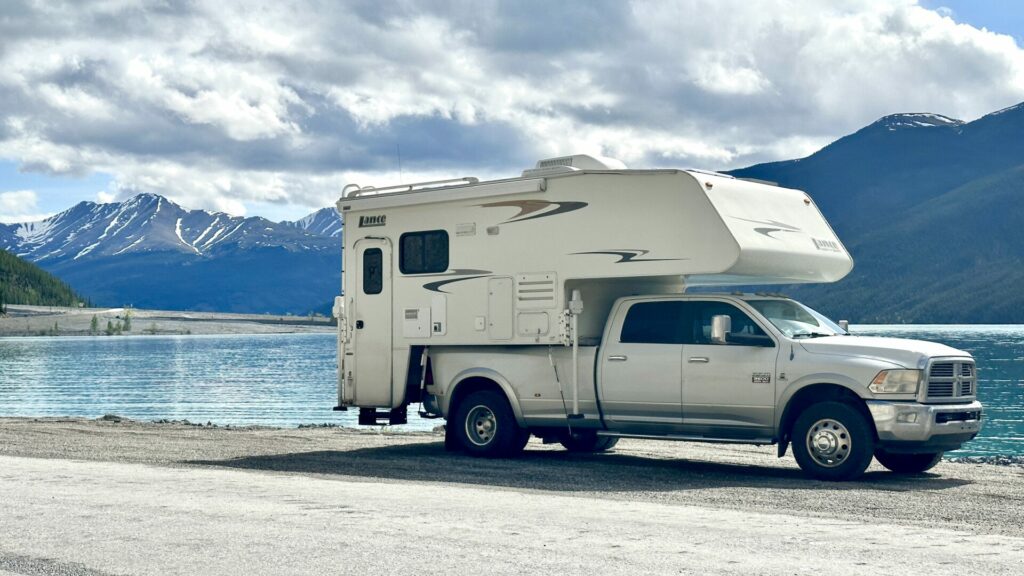
Truck campers are the last RV type on our list. They don’t quite fit into either category for drivable or towable RV, so they fall into their own category. A truck camper is a type of RV designed to be loaded onto the bed of a truck, creating a self-contained and mobile living space.
This type of RV allows you to use your existing truck and camp almost anywhere. They have four jacks mounted to the outside, so you can drop the camper off and go exploring without it.
Truck campers can have no slide-outs or up to three slides. Although small, they have everything you need to be self-contained, including kitchens and bathrooms. Modern designs have made interiors as luxurious as some high-end rigs.
Truck campers are popular among those seeking a nimble and efficient option for on-the-road living without the need for a separate towing vehicle.
If you think a truck camper is right for you, it’s important to note that you will need to confirm the payload capacities of your truck, as some modern truck campers can only be carried by heavy-duty trucks.
What Type of RV is the Most Popular?
As far as sales go, travel trailers are the most popular type of RV. Because there are so many different manufacturers and brands building travel trailers, you will find a wide range of sizes and floor plans to accommodate different preferences and needs.
The affordability of a travel trailer compared to motorhomes or fifth wheels makes them an attractive option as well. Most people are looking for an RV that they can explore on the weekends or take short vacations with, not a high-end RV for full-time living.
Additionally, the detachable nature of travel trailers allows for convenient exploration, as owners can park their RV and use their towing vehicle for local transportation without breaking down camp.
Learn More: We wondered, “Is the #1 Selling Travel Trailer Even the Best?” so we did our research, and now you can find out too!
What Type of RV is Easiest to Drive?
Generally, Class B camper vans are considered the easiest to drive among RV types. Their compact size and van-like structure make them more maneuverable than larger motorhomes or towable RVs.
Class Bs are often built on standard van chassis, allowing for easier navigation through narrow roads and urban environments.
Which Type of RV is Right For You?
As we conclude our deep dive into the different types of RVs, it becomes clear that there’s an option tailored to every adventurer’s taste and travel style.
From the compact and nimble to the spacious and luxurious, each RV type offers a unique blend of comfort, mobility, and amenities.


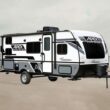

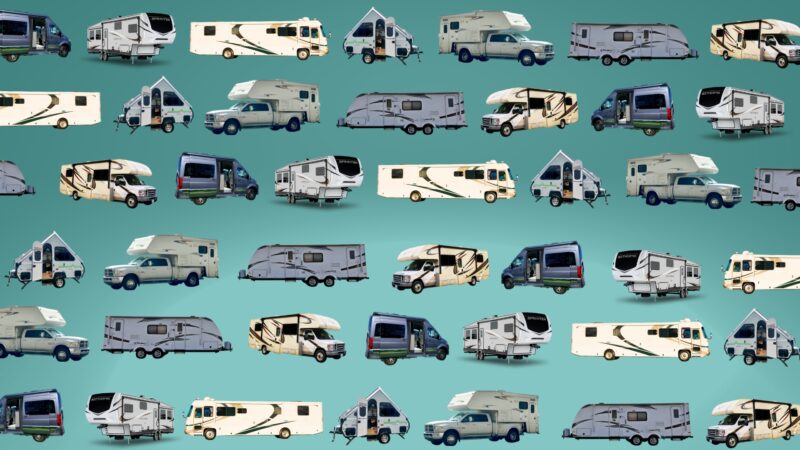
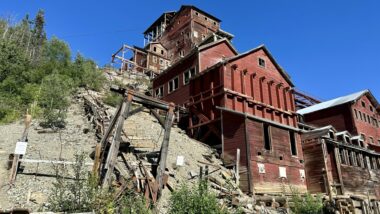

I’ve enjoyed your you tube channel immensely over the last year. We communicated once last summer regarding your BB Battery system etc. I did not want to be tacky and ask you how much the project cost, however I’m over that because I’ve adjusted my retirement plan and plan on pulling the plug Aug 2021. I’d like to be boondockable by then and am trying to set the budget. If you could give me your ball park that would be awesome. I will probably take BB’s recommendation for Sprads…..